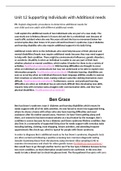Unit 12 Supporting Individuals with Additional needs
P1: Explain diagnostic procedures to determine additional needs for
one child and one adult with different additional needs
I will explain the additional needs of two individuals who are part of a case study. The
case study one is Rebecca Brown is 8 years old and she is a wheelchair user because of
road traffic accident when she was five years old and she has no movement below her
cervical spine.Also, Ben Grace is 52 years old and has Down’s syndrome, type-2 diabetes
and learning disability who also require additional support in his daily living.
Additional needs refers to the individuals who need help because of their physical and
mental disabilities.People may require additional needs because they may need support
to help with their condition. There might be environmental influences, genetic disorders,
or accidents. Disability is when an individual is unable to use any part of their bod,
whether physical or mental condition, which makes it harder for them to do a variety of
activities.(healthandsocialcaretextbook) Mild learning difficulties are thought to occur
when an individual can communicate but may not understand or be able to explain new
information properly. (healthandsocialcaretextbook) Moderate learning disabilities are
seen as occurring when an individual discovers basic language abilities unable to express
their emotions or what they need, making ordinary tasks like clothing themselves more
difficult. (healthandsocialcaretexbook) Furthermore, severe and profound learning
difficulties are when an individual has an extremely difficult time developing new skills,
requires help with everyday tasks,struggles with communication skills, and they have
physical disabilities. (healthandsocialcaretexbook)
Ben Grace
Ben has Down's syndrome, type 2- diabetes and learning disabilities which means he
needs support with all of his daily activities. He was forced to move into supported living,
where he shares a home with others who also have learning difficulties and need
assistance after his mother passed away. However, he hasn't been getting along well
there, as it seems he has been treated unfairly at a local funfair by the manager. Ben’s
condition is severe because he has a diabetes and Down syndrome lifetime condition. Ben
also lives in a community of supported living since he needs support with everyday tasks
including bathing, clothing, food shopping, leisure activities, and attending frequent
appointments like check-ups, which is typical for people with Down syndrome.
In order to diagnose Ben’s additional needs as he has Down's syndrome, diagnostic tests
are often carried out following a positive screening test. Common diagnostic testing
include: Examining tissue from the placenta using chorionic villus sampling (CVS) to
examine chromosomes and check for other genetic issues.(birthdefects/downsyndrome.)
Ben would have to go through another test to see if he has type-2 diabetes because he has
two more condition, so that information would need to be confirmed. In this test, Ben
needs to take a blood test to check his glucose level. The Occupational therapists will carry
, out the diagnosis of Ben’s learning disabilities. They will help him to improve his
communication skills, develop his basic skills, and work opportunities. They must provide
the individual’s needs and support their suffering challenges doing everyday tasks.
(occupational therapy) Also, the social workers or psychologists will carry out the diagnosis
of Ben as he has Down syndrome. They must listen to him and provide for his special
needs in order to make him feel more valuable, and they must be fair, precise, and
trustworthy to individuals who have disabilities. (social work England) Additionally, the
Diabetes specialist nurse or GP can do the diagnosis of Ben’s type-2 diabetes. The GP will
take a blood sample to check Ben’s blood sugar levels and check his urine. The results are
typically between 1 and 2 days. The specialist will discuss the test results and the
following steps with him. (nhs uk) Professionals in the social work services, healthcare,
nursing, and teaching must have a degree. They must then pursue more training and
specialise in that profession of care in order to evaluate and treat individuals with learning
disabilities in that particular area. (healthandsocialcaretextbook) Considering that Ben eats
more glucose than is normal, type 2 diabetes is most likely the cause. A nurse or
nutritionist who knows in this profession will be consulted once Ben has seen his doctor.
Individuals with Down syndrome will receive support from a medical professional. To
become a nutritionist, you would need five GCSEs between the grades A-C and a
bachelor's degree in clinical nutrition. To work as a healthcare professional, you must
have a level 3 degree in professional childcare and two years of post-qualifying work
experience in a child care facility. Additionally, to diagnose Ben’s condition as he has a
learning disability you must get a degree in occupational therapy, which can take up to six
years of part-time study or three years of full-time study to complete. In one to two years
of postgraduate study, a master's degree is achievable. After earning your degree, you
must register with the Health and Care Professions Council (HCPC) in order to begin
practising.(healthandcareersnhsuk) Ben's prognosis is that he will continue to have Down
syndrome for the rest of his life because his condition is inherited genetically. However,
because of the criticism that he receives from the manager of the local fair, en is not
complying with his diet that is specifically planned for his type 2 diabetes. Ben might have
received insulin if he had type-2 diabetes in order to lower the level of glucose in his
blood. As a result, his glucose is unstable and could be dangerous as he could eventually
die from it if he continues to eat unhealthy food. Additionally, Ben will remain having
social workers who will help him to provide what Ben needs in his daily life.
References
Aldworth, Carolyn, et al. BTEC Nationals Health and Social Care
M04_HSC_SB2_26029_U12_203-258.indd 203 15/09/2016 14:47
Student Book 2 : For the 2016 specifications, Pearson Education Limited, 2016. ProQuest Ebook
Central,
http://ebookcentral.proquest.com/lib/sfxavier6th-ebooks/detail.action?docID=4770651
https://rcotss-ip.org.uk/what-is-occupational-therapy#:~:text=Occupational%20therapists
%20may%20support%20people,shopping%20and%20using%20public%20transport
https://www.healthcareers.nhs.uk/explore-roles/allied-health-professionals/roles-allied-health-
professions/occupational-therapist
https://www.nhs.uk/conditions/type-2-diabetes/getting-diagnosed/




